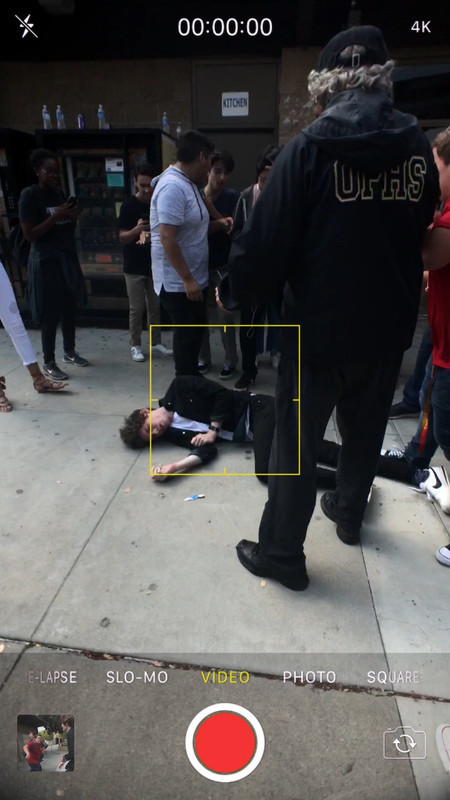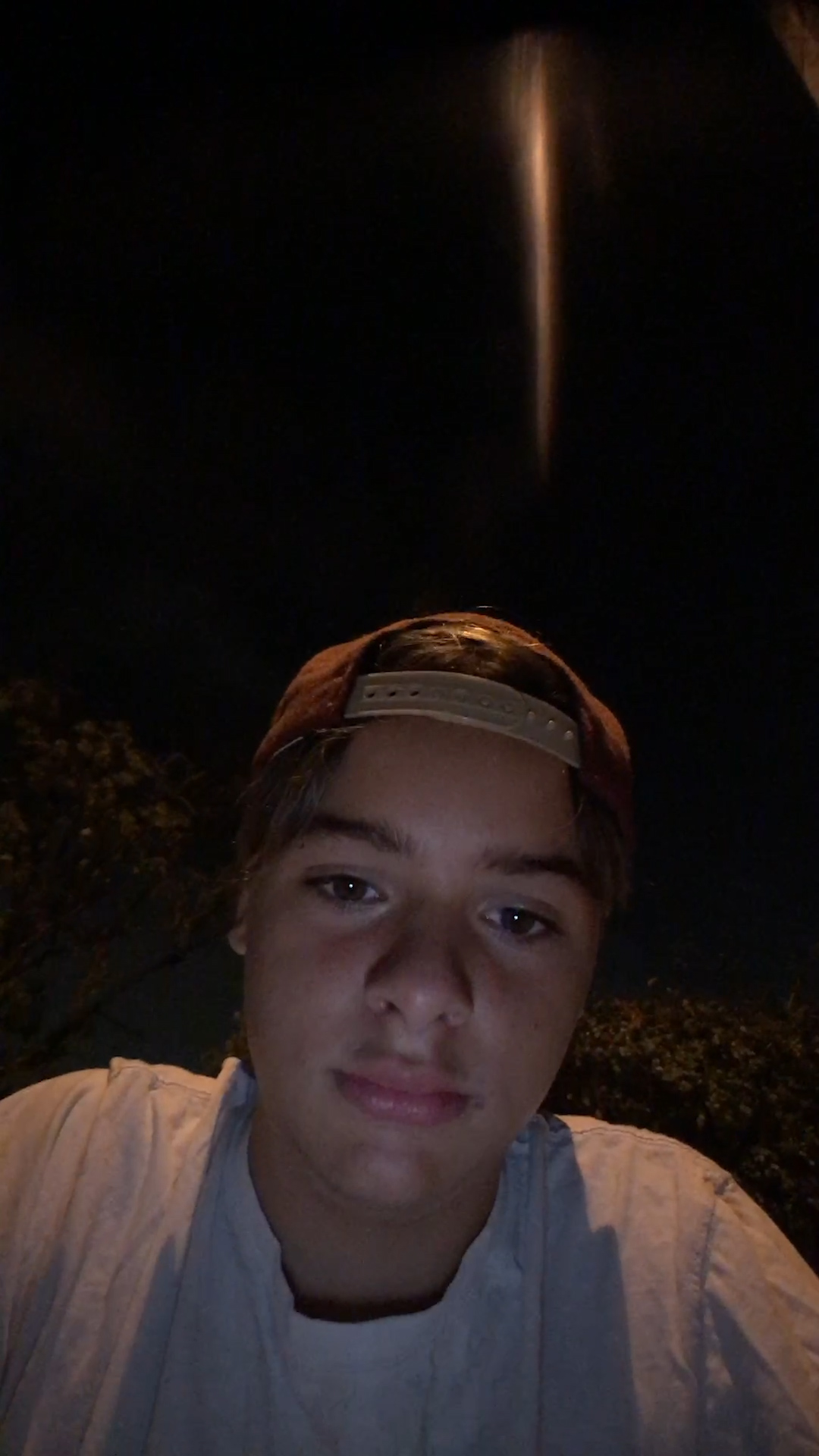I have never been a fan of the screen-based thriller genre. Films such as “Open Windows,” “Unfriended,” and “Searching” have never really sold me on the idea of coming into a movie theater and watching a computer screen for 80-90 minutes. I can get that at home. The acting never really works and the gimmick wears thin pretty quickly. I know this style has its admirers, but just cannot bring myself to buy into it.
<span class="s1" That is until I saw “Pocket,” a short film that takes the point of view of a smartphone for about 18 minutes. Had it had been a full hour longer, I might have lost my patience with it. But unlike the thrillers, the aesthetic here works because it doesn’t exist for a big payoff. This is life as seen through the eyes (and phone) of an American teenager named Jake (Mace Coronel) who cheats on tests, flirts with a girl he has never met (and waits anxiously for her replies), fights with his mom, tries to pass a driving test, films and posts fights at school and has the same phone addiction many of us have. Like Bo Burnham’s “Eighth Grade,” this film paints a painfully realistic portrait of the current American teenager and every parent who watches it will want to rush to check their kids’ phones, provided they can pry it out of their hands.
Unlike those aforementioned films, “Pocket” also benefits from not being in real time. It jumps around from day to day with many cuts and blink-and-you-miss-it glimpses into Jake’s life. The style will be hard for some to take and Jake is not exactly a likable protagonist. He whines, has little personality, and has idiotic friends, but it barely matters whether we like Jake or not. “Pocket” is a screen film that depicts, in its own subtle way, how screen addiction affects teenagers who are being raised on the screen and how it prevents someone from becoming a person of substance. They talk a lot, but rarely to each other. One student’s misery is another student’s snarky Instagram meme. And crushes can only be expressed via Snapchat where it goes from friendship to sex to isolation in a matter of minutes.
Filmmakers Mishka Kornai and Zach Wechter state at the beginning of the film (via text message) that it should be watched on a phone with headphones. I confess I didn’t follow that directive at first. A bit of screen snobbery probably factored into that decision, but I made good on the second viewing and I have to say, it is absolutely the best way to watch the film. Sound is a key element here, as well as the visuals, and I noticed a lot more when I watched it on my phone. “Pocket” isn’t for everyone, but for a brief moment, it made me a believer in this storytelling form.

Q&A with directors Mishka Kornai and Zach Wechter
How did this film come about?
More of our lives are taking place online and on phones now than ever before. We’ve been fascinated (and affected) by the digital revolution, and had been talking about wanting to make a project that involves our relationship to technology. Our collective, PICKPOCKET developed a unique capture system and storytelling format so we could make films that revolve around smartphones. We originally created the format for a non-fiction series on Facebook Watch called “Love & Longitude,” and it taught us a great deal about mobile storytelling.
When we decided to embark on our first fiction project in 2017, the first instinct we had was to center our story around a teenager. Focusing on what it’s like for kids who are growing up today with phones in their hands from as early as they can remember felt to us like the right lens through which to examine this stuff. What is it like growing up in a world where anything and everything can be shared or accessed? “Pocket” was our attempt to address that question through the experience of our teenage character, Jake.
Were the “screen thrillers” (“Open Windows,” “Unfriended” or “Searching”) on your mind when you made it?
Honestly, not really. We love the approach that “Searching” takes, but we’d already shot and edited most of “Pocket” by the time it premiered. Also, all three of those films take place in the context of desktop and laptop computer screens, as opposed to phones, which we think is a significant distinction.
Our smartphones are extensions of our bodies in ways that computers never have been; we have them with us always, we sleep with them right next to us, we bring them in the bathroom, in the car, and on our dates. Unlike computers—which tend to be static in one place or another—our phones are constantly bouncing around between our hands, our beds, tables, bags, and of course, our pockets. This constant presence near our bodies makes for very visceral storytelling, but poses a much more complex challenge to actually capturing and telling that story in ways that feel natural and comprehensible.
What was the production process like? How much was scripted/improvised?
“Pocket” had a complete script, which laid out our stream of consciousness narrative, dialogue, and moments very clearly. On set, we tried to build a complete world for our characters so they were able to have room to play and interact beyond what we had on the page. Certain scenes were added during shooting in order to flesh out specific elements of the narrative.
The most unconventional aspect of the filmmaking process was the fact that our lead actor, Mace Coronel, was also our lead camera operator, which created a unique dynamic in which we had to balance physical naturalism and effectively capturing our story. Lots of the performance conversations we had with Mace on set was about the blocking of each scene. The way in which people are positioned and holding their phones tells us a lot about how they’re relating to what’s on screen.

What was the casting process like? How did you explain what you needed from the actors?
We had known Mace for many years before we embarked on this project. When it came time to cast for the film and we found out he was a free agent after five years in a television contract, we knew he was the perfect fit.
Casting was mostly traditional for the other characters, but we also asked actors to send us links to their social media and put increased weight on how these characters would come across in still images—since that’s in large part how they appear in the film.
I imagine teens and parents will have varying reactions to the film. What do you hope people will take away from it?
So far, we’ve been thrilled to see the reactions to the film. Most teens have responded with a sense of surprise and recognition after watching what they feel is the first real accurate depiction of the lives they live on their phones. Parents have reacted strongly as well, often viewing the story as a cautionary tale, a perspective which is valid though not necessarily our intention. Our hope has always been for this film to invite viewers to take a step back, examine their relationship with technology, and draw their own conclusions.
Has the making of the film changed the way you use technology, particularly your phone?
PICKPOCKET is a millennial filmmaking group. We’re right in between Jake’s generation and Generation X and while I think the film has opened our minds to just how addictive the digital world can be, technology is inextricably integrated into our lives. We shot this film on phones and made it to be watched on phones, because like it or not this technology is here to stay.
What’s next for you?
While finishing “Pocket,” we started developing several new projects -both narrative and non-fiction- which we’ll be able to announce soon! We’re excited about all the storytelling possibilities in this format, and about all new opportunities created by phones as the new viewing medium. The size of the phone screen, the context of watching out in the world, and the fact that you hold the device in your hand sets it apart from the mediums of the past, like theaters, TV, and computers. With our work at Pickpocket, we’re specifically making content that’s designed to be viewed on these screens.












